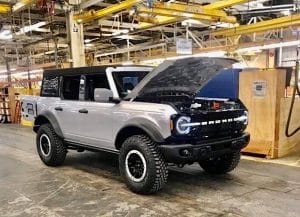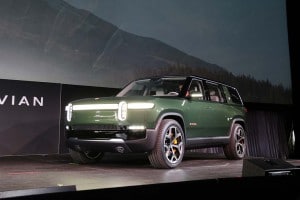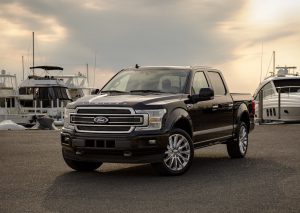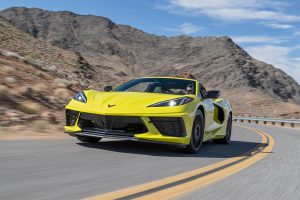
One impact of the coronavirus pandemic has been the delay, or potential delay, of vehicles like the Ford Bronco into the marketplace.
(This story has been updated with additional details on the number of product delays, as well as new comments by analyst Jeff Schuster of LMC Automotive.)
Hammered by the coronavirus pandemic – which has sent both sales and revenues tumbling and kept most designers and engineers away from their offices – automakers are being forced to delay a number of products that were set for launch during the second half of 2020, with the impact likely to spread into 2021 and, perhaps, beyond, according to industry experts.
In some cases, the delays will be minor, perhaps a month or three past a product’s original launch date. Others could be pushed back a year or more, some even scrapped entirely, several experts told TheDetroitBureau.com.
Among those high-profile products that have seen some sort of delay are the Ford F-150 pickup and Mach-E battery-electric vehicle, the Cadillac Escalade, the Acura MDX and the Rivian R1S and R1T.
(This could be the Make-It-Or-Break-It Year for Ford.)
“There are a couple reasons things have had to slow down,” said Stephanie Brinley, principal analyst with IHS Automotive. Notably, automakers posted massive losses during the first quarter and are losing more during the April-June period due to the pandemic-led sales slump, she said, noting that “there just isn’t as much money to go around” as was planned when product programs were laid out.
Then there’s the fact that most manufacturers have had to send designers and engineers off to work at home. But, added Brinley, with products in their final months of development “there may be some final things that couldn’t be done remotely.”
The two-month shutdown and slow restart of automotive assembly plants has posed another headache, especially if a factory was set to go through an extensive changeover to accommodate a new product.
There’s also the concern that some suppliers are now struggling financially which could further delay upcoming launches or pose a threat to products a bit further back in the pipeline.
Most of the manufacturers reached by TheDetroitBureau.com were reluctant to discuss delays. In some cases that is because they may not yet have formally announced hard launch dates. But combining what we could gather from company insiders, information from analysts including IHS and LMC Automotive, and other sources, the list includes such products as:
- The Ford F-150 pickup, Mustang Mach-E battery-electric vehicle, and Bronco and Bronco Sport SUVs;
- General Motors’ Cadillac Escalade, some variants of the Chevrolet Corvette, such as the Z06, and some of the automaker’s upcoming battery-electric vehicles;
- The Acura MDX sport-utility vehicle;
- Rivian’s first two all-electric products, the R1T pickup and R1S sport-utility vehicle.
The suburban Detroit-based Rivian was one of the few manufacturers to acknowledge a launch delay, its two battery-electric vehicles pushed back from late 2020 to next year.
Ford did acknowledge that some models will go into production later than originally planned but, with its factories quickly ramping back up to pre-pandemic speeds, it is still expecting to get them into showrooms “late this year,” according to spokesman Michael Levine.

The arrival of Rivian’s R1S and R1T models, originally to have been available in the fourth quarter of 2020, have been pushed back until early next year.
(Ford set to unveil next-generation F-150 on June 25.)
A full list of the products impacted by the coronavirus likely never will become available. That could include mid-cycle updates and low-volume niche offerings manufacturers have so far said little about.
If anything, some minor updates appear to be getting pushed back, said Jeff Schuster, autos chief at LMC Automotive, “so manufacturers could focus on more important, cash-generating, all-new product launches.”
Meanwhile, manufacturers may not have decided on some projects as they wait to get a sense of how the car market in the U.S. – and other regions of the world – recovers. What’s clear is that things aren’t looking good. Last week, consultancy AlixPartners released a study warning global light vehicle sales will come in at just 70.5 million this year, off 20% from 2019. For its part, IHS is forecasting full 2020 U.S. demand will dip 25%, to 12.7 million, and rebound to just 14.3 million next year. Automakers sold 17.1 million vehicles in the States in 2019 but IHS doesn’t even foresee a 16 million target before 2024.
“There are thousands of projects within our R&D, and we have to question whether we need to do them all,” Håkan Samuelsson, the CEO of Volvo, told Automotive News Europe in April.
One product widely expected to be dropped – though it has not yet formally been announced – is the Volvo XC100 which would go up against vehicles in the Range Rover line-up. The financial crisis appears to be having a particularly big impact on smaller, less financially well-off brands, such as Aston Martin which was already trimming or delaying products as the pandemic hit.

The new Ford F-150 will be unveiled June 25, but its arrival in dealer showrooms may be pushed back from its original timeline.
Going into 2020, automakers expected to launch 38 new or refreshed models produced in North America, according to an internal study by LMC Automotive, and 65 including imports. Of those produced in North America a third have now been delayed slightly but will still come out before the end of the year, with 12 more pushed into 2021. And some of those, LMC autos chief Jeff Schuster cautioned in an interview with TheDetroitBureau.com, “there’s still substantial risk that some launches could push further back into 2021.”
In some cases, these delays could have a serious financial impact, leaving a newly converted factory idled or operating at slower-than-normal rates, and dealers struggling for product to sell. But the impact may not be entirely negative, added analyst Brinley.
(Lincoln, Rivian scrub Lincoln EV project due to coronavirus.)
It “could be a bit of a silver lining (if they) were going to launch into a weak market” she told TheDetroitBureau.com, if it pushes the launch out to a point when the market is stronger and factories will be able to operate more efficiently.

